Pheidole capensis Mayr
  Type location South
Africa (Pheidole capensis
n. sp., Mayr, 1862: 746, major & minor; illustrated by Mayr,
1865; Forel, 1913a: 130, queen) - see below Type location South
Africa (Pheidole capensis
n. sp., Mayr, 1862: 746, major & minor; illustrated by Mayr,
1865; Forel, 1913a: 130, queen) - see below
junior synonym here
dregei (Ph.
megacephala, subsp. capensis
Mayr, sous-esp. dregei, n. subsp., Emery, 1895h: 34,
major) from South Africa - see below
 . .
Note: The
form described as reddenburgensis (Ph.
(Allopheidole) cuitensis For. r. reddenburgensis n. st.,
Forel, 1913a: 135, all forms; subspecies of capensis by Emery,
1915j: 246) from South Africa is unmistakeably a relative of Pheidole sculpturata, with its
distinctive postpetiole with elongated, back-curved processes when
viewed from above. It is almost identical to the form described as P. sculpturata areolata Forel
(1911e).
The
form described as modestior (Pheidole
capensis Mayr, var. modestior,
n. v., Santschi, 1919a: 337, major & minor) from South Africa appears to be a junior
synonym of Pheidole aspera Mayr, 1862. |
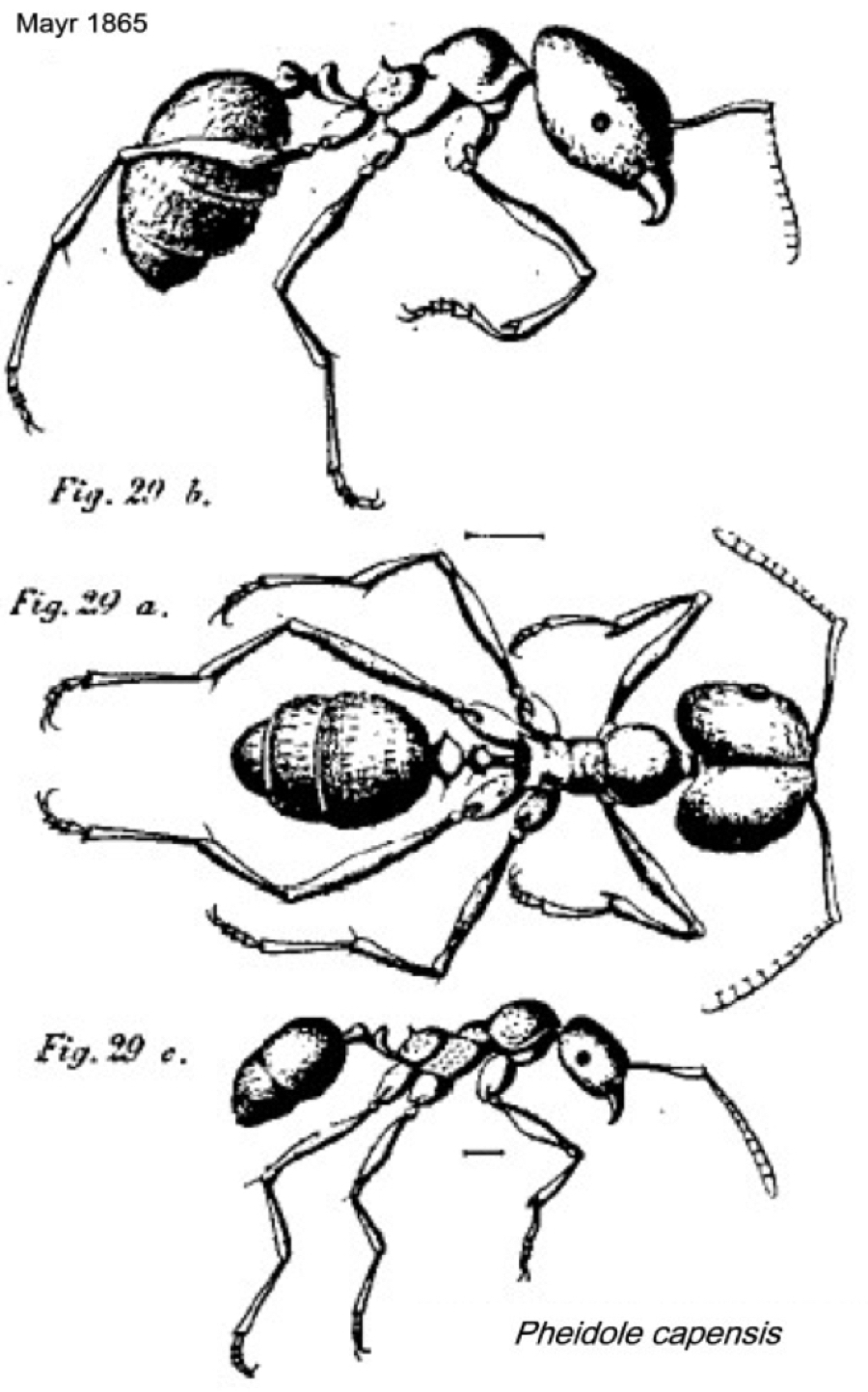 Mayr's
(1862) description is at Mayr's
(1862) description is at  . Mayr (1865: 100) gave a
fuller
description, this is at . Mayr (1865: 100) gave a
fuller
description, this is at  . Arnold (1920a: 441)
gave an illustrated translation, this is at . Arnold (1920a: 441)
gave an illustrated translation, this is at  and and  . Emery's (1895a) description of dregei
is at . Emery's (1895a) description of dregei
is at  . .
|
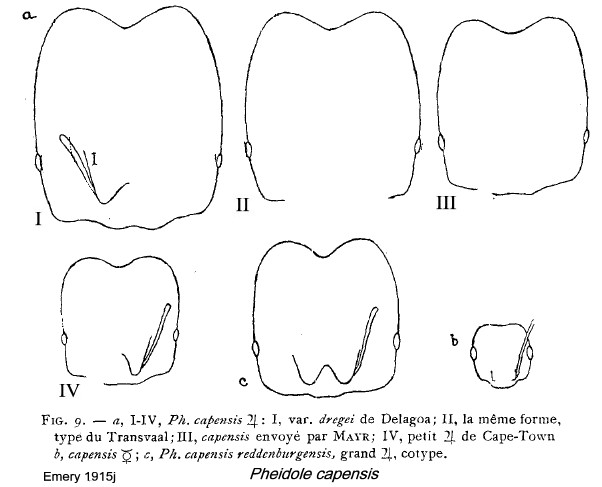 Emery
(1915j) provided drawings of the heads of capensis Emery
(1915j) provided drawings of the heads of capensis
|
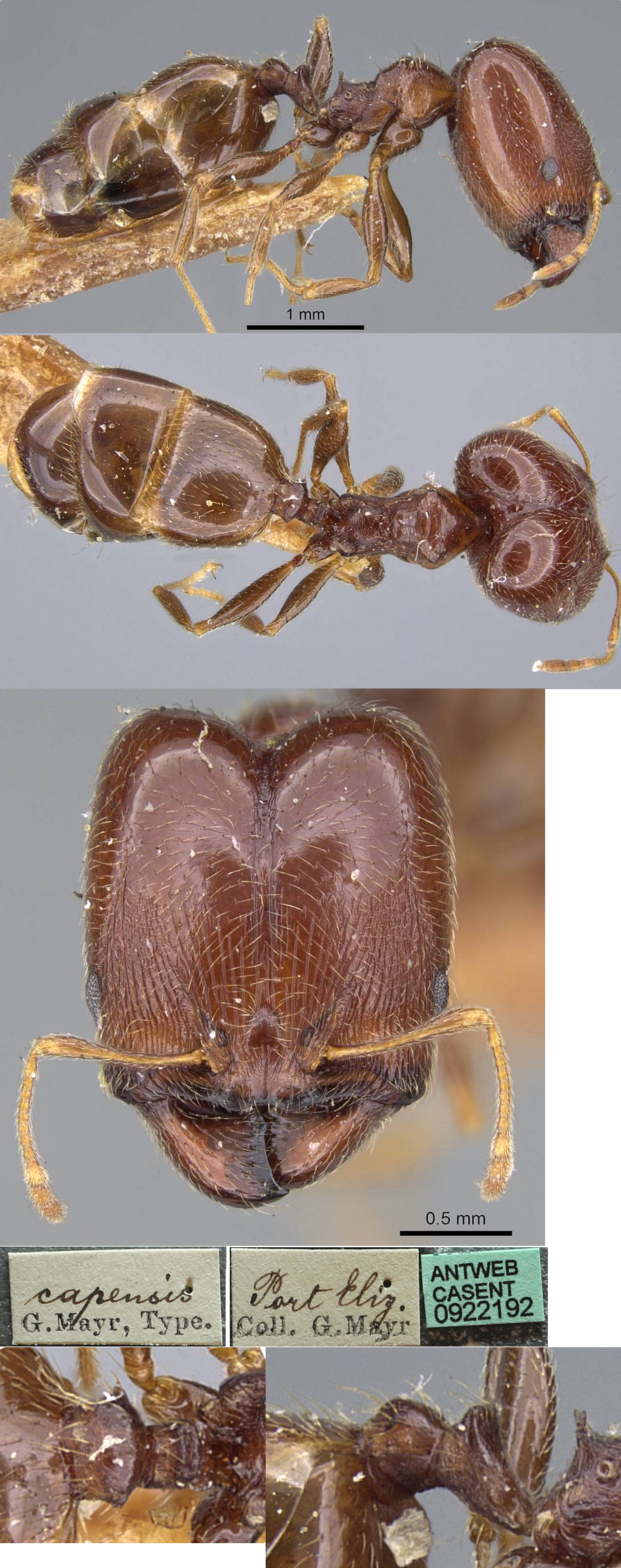 The photomontage of
the "Port Elisabeth" major worker in the Vienna Museum is collated
from http://www.antweb.org/specimen.do?name=casent0922192. The photomontage of
the "Port Elisabeth" major worker in the Vienna Museum is collated
from http://www.antweb.org/specimen.do?name=casent0922192.
TL ca 6.0 mm, HL 1.83, HW 1.66, SL 0.45, PW 0.72, CI 89,
SI 44.
Apart from the obvious colour difference (perhaps
accentuated by the different magenta levels of the Antweb imagery) the
two majors have similar shapes and proportions. The Vienna
specimens lacks pubescence on the gaster posterior to segment
two. Apart from the curious small head shown in the Mayr drawing they
are a match to that. The quite narrow head in profile seems a good
diagnostic character as is the only slightly extended rhomboidal shape
of the postpetiole seen from above.
|
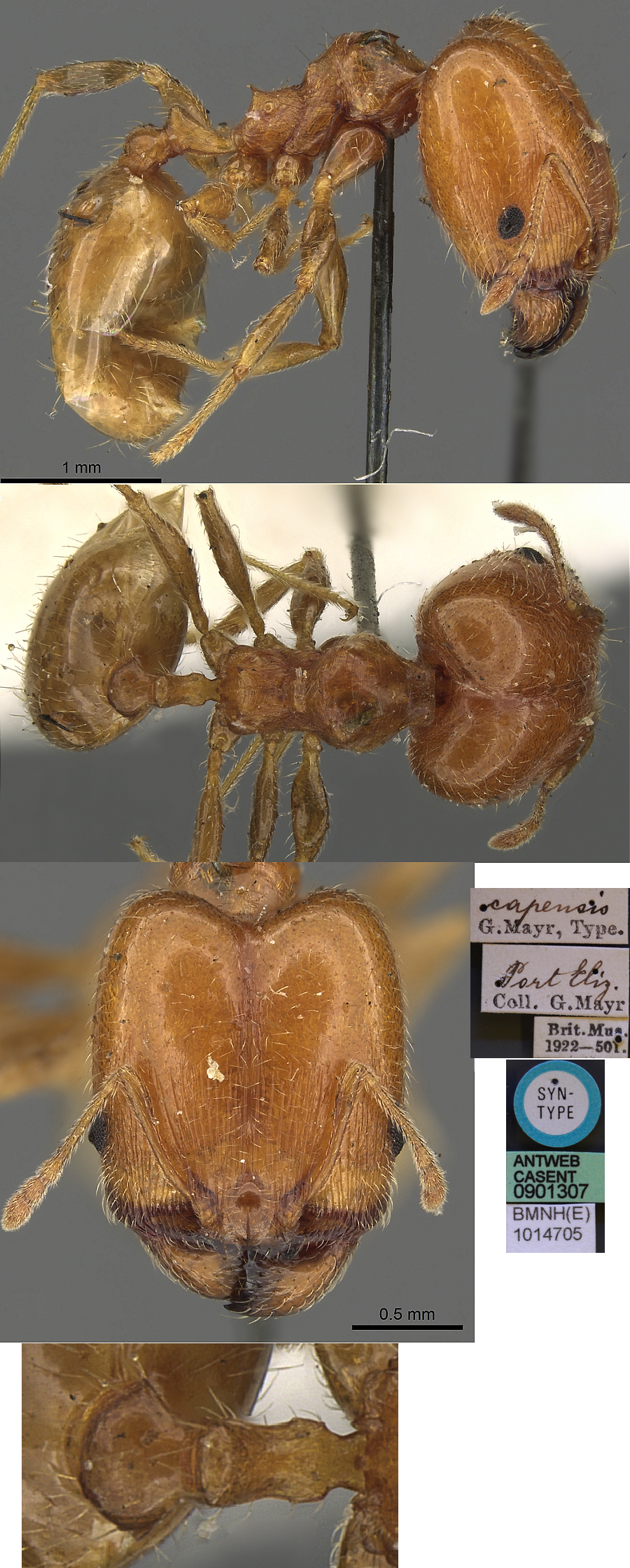 The photomontage of a
syntype major worker from Port Elisabeth is collated
from http://www.antweb.org/specimen.do?name=casent0901307. The photomontage of a
syntype major worker from Port Elisabeth is collated
from http://www.antweb.org/specimen.do?name=casent0901307.
TL ca 6.0 mm, HL 1.59, HW 1.44, SL 0.68, PW 0.70, CI 89,
SI 48.
|
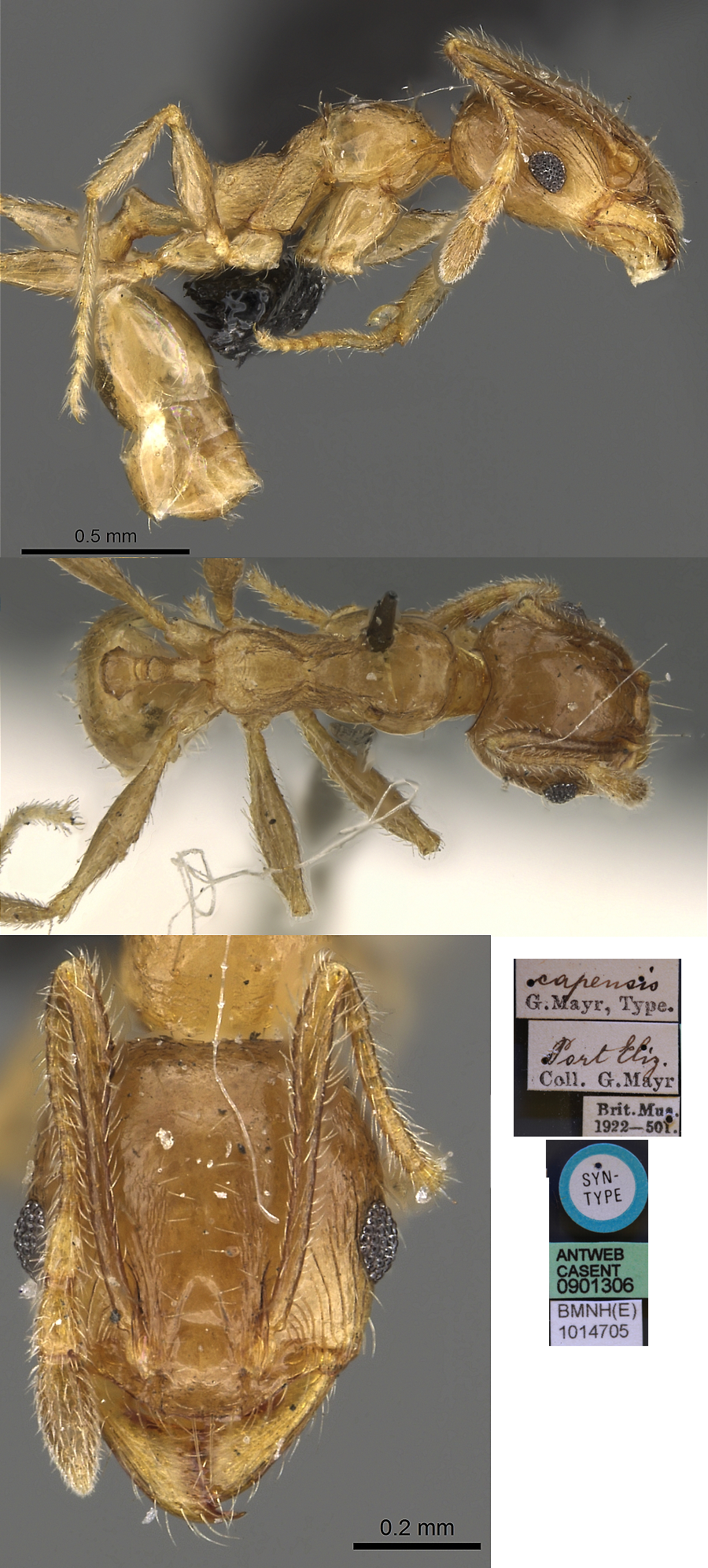 The photomontage of a
syntype minor worker from Port Elisabeth is collated
from http://www.antweb.org/specimen.do?name=casent0901307. The photomontage of a
syntype minor worker from Port Elisabeth is collated
from http://www.antweb.org/specimen.do?name=casent0901307.
TL ca 2.7 mm, HL 0.61, HW 0.56, SL 0.62, PW 0.29, CI 89,
SI 114.
Head sub-square with near straight sides and occiput;
frons smooth, genae with short striations; scapes surpass occiput by
about 1/4 of their length; promesonotum profile shallowly domed,
propodeal spines seemingly very small; pedicel low, postpetiole from
above slightly longer than wide with distinct minute lateral apices.
A "Cap" minor worker in the Vienna Museum and on Antweb
at http://www.antweb.org/specimen.do?name=casent0922191
is mislabelled and is a minor of Pheidole
aspera, also described by
Mayr (1862) and found at Cap.
|
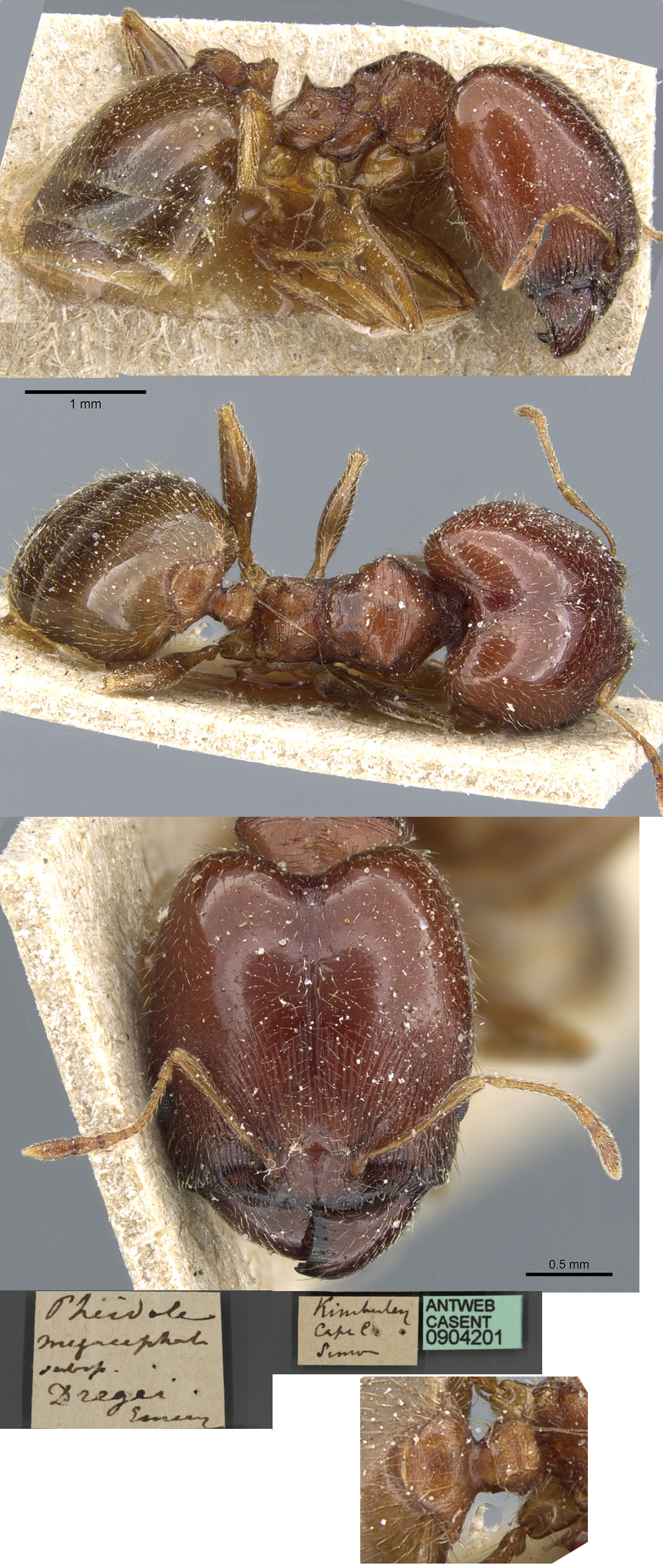 The photomontage of the type
major worker of dregei is
collated
from http://www.antweb.org/specimen.do?name=casent09042011. The photomontage of the type
major worker of dregei is
collated
from http://www.antweb.org/specimen.do?name=casent09042011.
TL ca 6.5-7.0 mm, HL 2.11, HW 1.95, SL 0.78, PW 1.0, CI
93, SI 40.
Head in full face view with evenly convex sides and
quite deeply impressed occiput; alitrunk relatively short and
stocky, much wider than the type capensis;
propodeal spines broadly based triangles; petiole node thick in profile
and from above, postpetiole distinctly widened laterally; gaster with
abundant appressed pubescence on all segments.
The minor is unknown.
|
|